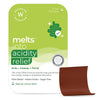We've all experienced that uncomfortable burning sensation in the chest after a late-night snack or a heavy meal. Acid reflux can strike at the worst times, leaving you restless and uncomfortable. While certain foods are well-known triggers, when you eat can be just as important as what you eat. Poor meal timing can disrupt digestion, increase acid production, and worsen reflux symptoms. The good thing? With a well-structured eating schedule, you can take control of your digestive health and minimize discomfort.
Why Meal Timing Matters for Acid Reflux
Your digestive system follows a natural rhythm, designed to process food efficiently at certain times of the day. When meals are consumed too close to bedtime, eaten sporadically, or spaced too far apart, this rhythm is disrupted. Here's how poor meal timing can contribute to acid reflux:
-
Overeating Due to Long Gaps Between Meals: When you're extremely hungry, you're more likely to eat quickly and consume larger portions. This can put excessive pressure on the stomach, forcing acid upward.
-
Irregular Meals Lead to Overproduction of Acid: Skipping meals or waiting too long between them can cause excess stomach acid buildup, which may lead to irritation and reflux.
-
Late-Night Eating Worsens Symptoms: Lying down too soon after eating makes it easier for stomach acid to travel up into the esophagus, causing heartburn and discomfort.
- Eating Too Quickly Hinders Digestion: Rushed eating often leads to swallowing air, which can contribute to bloating and increased pressure on the stomach, triggering reflux.
By maintaining a structured meal schedule and allowing adequate time for digestion, you can reduce acid reflux episodes and support overall gut health.
The Best Time to Eat to Prevent Acid Reflux
Maintaining a structured eating schedule is important to keeping acid reflux in check. Here’s what you should keep in mind:
-
Breakfast: Eating within an hour of waking up kickstarts your metabolism and prevents excessive acid buildup. A balanced breakfast with fiber, healthy fats, and protein sets the tone for stable digestion throughout the day.
-
Lunch: A midday meal with lean proteins, whole grains, and non-acidic vegetables provides steady energy without overloading the stomach.
-
Dinner: Aim to eat at least three hours before bedtime. This allows your body enough time to digest before lying down, reducing the risk of acid creeping into the esophagus.
-
Snacking: If hunger strikes between meals, choose gut-friendly options like almonds, bananas, or yogurt. Ideally, avoid snacking within two hours of sleep to prevent nighttime reflux.
By following this structured approach, you’re giving your digestive system the best chance to function efficiently and minimize discomfort.
Supporting Better Digestion and Acid Reflux Relief
A well-planned meal schedule, combined with mindful lifestyle habits, can significantly reduce acid reflux symptoms. Here’s how to create a reflux-friendly routine:
-
Stick to Regular Meal Times: Eating at consistent intervals helps regulate acid production and keeps your digestion stable.
-
Avoid Skipping Meals: Long gaps between meals can cause acid levels to rise, leading to heartburn even before your next bite.
-
Practice Mindful Eating: Eating slowly and intentionally allows your stomach to process food properly and reduces the risk of overeating—a common trigger for reflux.
-
Stay Upright After Eating: Sitting or standing for at least an hour after meals prevents acid from flowing back into the esophagus.
-
Hydrate Smartly: While water is essential, drinking too much during meals can dilute stomach acids and hinder digestion. Instead, sip throughout the day.
-
Wear Loose Clothing: Tight waistbands can put unnecessary pressure on your stomach, worsening reflux symptoms.
-
Incorporate Gentle Movement: A short walk after meals aids digestion and prevents acid buildup.
Enhancing Digestion with Natural Remedies
Beyond meal timing and lifestyle habits, natural digestive aids can offer additional relief. Ingredients like apple cider vinegar, licorice root, ginger, and fennel are known to balance stomach acid and promote smoother digestion.
For those seeking extra support, high-quality supplements designed to ease acidity and improve gut health can be beneficial. Look for options with probiotics, prebiotics, and alkalizing ingredients to help neutralize excess acid and maintain a healthy digestive balance. Always choose clean, research-backed formulations that support your body's natural processes.
Final Thoughts
Managing acid reflux isn’t about restrictive eating—it’s about working with your body’s natural rhythm. By prioritizing meal timing, choosing gut-friendly foods, and supporting digestion with natural remedies or supplements, you can enjoy meals without the discomfort of acid reflux.
So, the next time you think about reaching for a late-night snack, remember: timing is everything. Give your body the time it needs to digest, and it will reward you with fewer flare-ups and a happier gut.





























